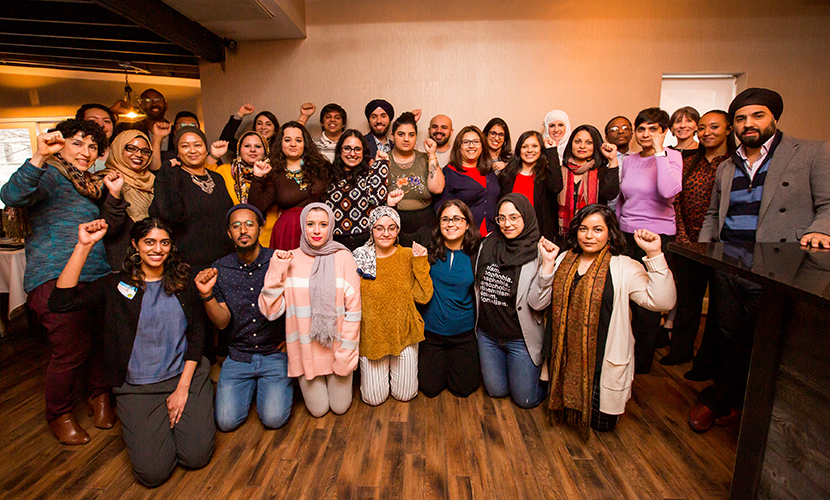The RISE Together Fund (RTF) is celebrating 10 years of grantmaking in 2019! Throughout 2019 we are sharing 10 lessons on what we’ve learned over the course of 10 years.
By Amardeep Singh (Senior Program Officer, Equality Team, at the Open Society Foundations) and Claire Downing (Program Officer, RISE Together Fund)

“We realized that we didn’t need to build a movement; the movement was already there. But we did have an opportunity to help shape and amplify the work of those dedicated to accelerating new ways of thinking about global social progress.” (Sarah Zak Borgman, Skoll World Forum on Social Entrepreneurship, “The Power of Convening for Social Impact”)
As communities of color, immigrant communities, and other marginalized populations face unrelenting policy attacks and public vitriol, there is a growing need to foster intra- and inter-community solidarity within and across social and racial justice movements. The RISE Together Fund (RTF), through our annual grantee convenings and our partnership with the Open Society Foundations (OSF), has dedicated funding to support Muslim, Arab, and South Asian (MASA) communities to convene, collaborate, and build solidarity with other frontline activists both within and outside MASA communities. Read more below about how the RTF-OSF partnership, and RTF’s regular convening of our grantees, have fostered a stronger and more connected MASA field and encouraged creative, collaborative work across movements and organizations.
Case Study 1: Cross-Movement Collaboration Through the OSF-RTF Advocate Travel and Convening Fund
Since 2015, the RTF-OSF Advocate Travel and Convening Fund (“Convening Fund”) has made over $175,000 in grants to RTF and OSF grantees solely dedicated to funding grantee self-organized convenings that connect activists across movements within and outside the MASA community. Grantees have told us that they cannot get this funding from any other sources in philanthropy. Here are three lessons we’ve learned from our shared work on the Convening Fund:
Lesson 1: Provide Funding to Support Grantees’ – Not Funders’ – Priorities
RTF and the OSF team started the Convening Fund in 2015 to help activists and organizations working in or with MASA communities get access to funding that was not tied to a funder’s agenda or did not make attendees feel like they had to show up to a funder-led event in order to get or sustain funding. The Convening Fund flips the funder-grantee power dynamic on its head and says, “how do you, the frontline activists, want to convene? What work do you want to accomplish, and with whom? Let us funders support you in choosing how you want to be in space with each other.”
Lesson 2: Pooled Resources Can Contribute to More Effective Grantmaking
The RTF-OSF partnership is a unique thought partnership between a smaller donor collaborative and the program of a large, international philanthropic organization. Co-managing the Convening Fund requires a nimble, flexible approach to grantmaking (through modest grants, usually approved within 2-3 weeks) and relies on RTF’s ability to quickly review and vet proposals as well as its bird’s eye view of the field to understand how grant recommendations will help further create or maintain relationships within the MASA field and beyond.
Lesson 3: Funding Convening with an Eye Towards Cross Community Collaboration Contributes to a More Vibrant Democracy
Finally, the Convening Fund has been an experiment in funding what MASA communities and organizations and those in the wider racial and social justice fields have always fought for – a vibrant, pluralistic American democracy where marginalized communities can achieve liberation together. The Convening Fund has helped to bring diverse communities together and see for themselves where and how their common fates intersect. As RTF grantee (and Convening Fund recipient) MSA West attests, a grant from the Convening Fund allowed training for students on “how to authentically engage with and include marginalized communities such as convert and Black Muslims.”
Here are two examples of recent grants that further demonstrate this intersectional approach:
Case Study 2: Investing in Regular and Sustained Opportunities for RTF Grantees to Convene and Collaborate
In addition to the Convening Fund, RTF has been bringing together its grantees since 2017. These grantee convenings foster knowledge and partnership among our grantees, and provide regular opportunities for grantees to pause, reflect, and engage in self-care/healing justice practices.
For example, as a result of conversations that percolated at the 2018 RTF grantee convening in Washington, D.C., the MASA Organizing team and several RTF grantees and field partners developed a nonpartisan 2018 midterm platform for MASA communities. Additionally, at the 2019 RTF grantee convening in Washington, D.C., Khudai Tanveer of the National Queer Asian and Pacific Islander Alliance (NQAPIA) met Thenmozhi Soundararajan of Equality Labs, and from that meeting, the two organizations developed training for NQAPIA on caste oppression. Finally, the convening brought about shared work between NQAPIA and Justice for Muslims Collective on a queer Muslim listening session, which around 30 people attended.
Attendees at the 2019 convening gave a 94 percent positive rating to the convening’s stated goal of “building relationships and networks,” and a 91 percent positive rating to the goal of “pausing, renewing, and rejuvenating.” One 2019 convening participant said that “most of the participants were not there to show off their work in front of a funder, but to genuinely connect with others in the field to do better by and for our communities.”
Conclusions
Supporting a diverse field through the grantee self-organized Convening Fund, and regularly convening RTF’s grantees, has helped us to provide a space for strategic conversations; to allow leaders to gather in person to support each other in challenging times; to encourage space to think creatively about how to engage the current challenges; and to spark new connections for collaboration across MASA organizations and in the broader immigration and racial justice space. These convenings also help RTF to identify gaps, and future areas of support. Both the Convening Fund and RTF’s yearly grantee convenings are a testament to how funders can support the development and growth of a field rather than drive the agenda.